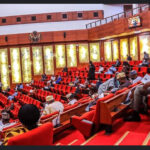Nigeria’s FX Reserves Gain $364 Million in Two Weeks, Marking First Steady Climb Since January Peak

Nigeria’s foreign exchange (FX) reserves have risen by $364 million over the past two weeks, marking the first consistent increase since the reserves peaked in January 2025.
This development signals a potential turning point for Africa’s largest economy, which has faced significant currency pressures and economic instability in recent months.
The Central Bank of Nigeria (CBN) attributes this growth to a series of deliberate policy reforms aimed at improving governance, transparency, and operational discipline.
These measures form part of broader efforts by the administration of President Bola Tinubu to stabilize the naira, boost investor confidence, and support economic recovery.
Nigeria’s economic challenges have been compounded by high inflation, volatile oil prices, and foreign exchange shortages.
However, the World Bank recently reported that the country’s economy grew by 4.6% year-on-year in the fourth quarter of 2024 – the strongest performance in a decade.
This robust growth has been largely credited to a series of bold economic reforms, including:
• Petrol Subsidy Removal: Eliminating costly fuel subsidies to reduce fiscal pressure.
• Exchange Rate Reforms: Implementing two significant naira devaluations to reflect market realities.
• Electricity Allowance Reduction: Cutting back on unsustainable power sector subsidies.
These measures have helped Nigeria achieve a more market-driven exchange rate, improving liquidity and supporting the recent accumulation of FX reserves, which have now surpassed $37 billion.
The recent increase in foreign exchange reserves provides a crucial buffer against external financial shocks and reflects the effectiveness of Nigeria’s ongoing economic policies.
This financial cushion is expected to enhance the central bank’s ability to manage currency volatility, stabilize the naira, and reduce inflationary pressures.
While this reserve gain is a positive sign, experts warn that sustained economic recovery will require continued adherence to tight monetary policies, disciplined fiscal management, and structural reforms to address Nigeria’s long-term economic vulnerabilities.
As Nigeria continues on its path to recovery, the focus will likely remain on diversifying the economy, reducing reliance on oil revenues, and creating a more resilient financial system to weather future economic shocks.









